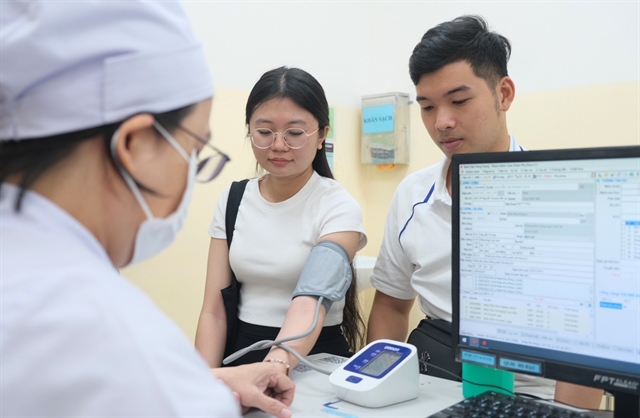 |
| A couple has a premarital health check-up at Hùng Vương Hospital in HCM City. – VNA/VNS Photo |
HÀ NỘI The Việt Nam Population Strategy has set a target that 90 per cent of young couples will receive premarital counselling and health check-ups by 2030. This year the Ministry of Health has selected ‘engaging the premarital consultation and health examination’ as the theme of the National Action Month on Population and Vietnamese Population Day (December 26).
In response to the action month and Vietnamese Population Day, this month the Department of Population and Family Planning, Hùng Vương Hospital and the HCM City Youth Union provided premarital counselling and health check-ups to 154 young couples who are workers living in difficult circumstances.
These couples have an average age of 27 years old for men and 26 years old for women.
Associate Professor Hoàng Thị Diễm Tuyết, director of Hùng Vương Hospital, said that out of 154 couples, up to 150 men have reproductive health problems. About 21 per cent of women have anaemia, 4.6 per cent with uterine fibroids, 6.5 per cent with diabetes, and 6.5 per cent with hepatitis B infection. Meanwhile, 3.2 per cent of the women suffer from reduced ovarian reserve and 1.3 per cent were diagnosed with reduced ovarian cysts.
These numbers do not represent the health status of all young people in HCM City, but raise an alert over the importance of premarital counselling and health check-ups, the doctor told Vietnam News Agency.
According to many experts, premarital consultation and health examination are considered an extremely important first form of screening to improve population quality.
It is estimated that each year, Việt Nam has 22,000-30,000 children born with birth defects. Among those are common diseases like Down, Edwards syndrome, neural tube defects, congenital hypothyroidism, G6PD deficiency, congenital adrenal hyperplasia, severe haemolytic anaemia, as well as other genetic and birth defects.
Doctor Phạm Thúy Nga, head of the Assisted Reproductive and Andrological Department at Hà Nội Obstetrics and Gynaecology Hospital, said some young people lack concern over premarital consultation and health examination as they do not really understand the examination’s value.
She proposed strengthening communication for engaged couples so that they understand the benefits of premarital examination in general and screening for genetic diseases in particular.
According to Dr Nga, premarital health examination brings great benefits not only to reproductive health, but also physically and mentally for the married life of future couples. These necessary steps help prevent, detect and treat many dangerous genetic diseases early, avoiding unnecessary consequences in married life and the future children.
The test will prepare the couples with the best physical conditions before becoming parents, she said.
“If you have health problems, you have time to treat them to ensure you are in the best shape to prepare for the baby’s birth.
“For young people, late pregnancy may not be a major problem, but for those who get married at an older age, this can deprive them of the opportunity to have children,” she said.
If they have genetic diseases or carry disease-causing genes, young people will receive advice from experts to avoid giving birth to children with genetic diseases, increasing the burden on family and society. This also means improving population quality, she said.
She said six months before marriage is the “golden time” for couples to conduct a premarital examination. In the unfortunate case of detecting abnormality, six months is enough time for the doctor to come up with a complete treatment plan for existing health problems.
Changing awareness and behaviours
Dr Nguyễn Tân Sơn, deputy director of the Centre for Training and Development, General Department of Population under the Ministry of Health, said the lack knowledge on taking care of reproductive and sexual health among many young people was the responsibility of parents, teachers and state management agencies.
These groups have been blamed for not providing appropriate information to young people.
Sơn said the reproductive and sexual health education programme being piloted at schools has not been updated following international guidelines
He added that the consultation services are not truly friendly and comprehensive. Adolescents tend to choose private medical facilities, but these facilities have not had friendly service quality monitoring.
Associate Professor Lưu Bích Ngọc, chief of office of the National Council for Education and Human Resource Development, Ministry of Education and Training, said the education sector has integrated reproductive health education into the curriculum, at the same time, offering training on gender equality for teachers at all grades. VNS
- Reduce Hair Loss with PURA D’OR Gold Label Shampoo
- Castor Oil Has Made a “Huge” Difference With Hair and Brow Growth
- Excessive hair loss in men: Signs of illness that cannot be subjective
- Dịch Vụ SEO Website ở Los Angeles, CA: đưa trang web doanh nghiệp bạn lên top Google
- Nails Salon Sierra Madre
 VnExpress News The News Gateway of Vietnam
VnExpress News The News Gateway of Vietnam





